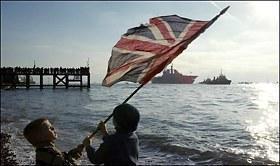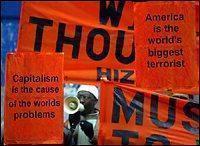 |
 |
| ALASTAIR GRANT / THE ASSOCIATED PRESS |
| Boys wave a send-off on Jan. 11 as the British aircraft carrier Ark Royal leaves Portsmouth Naval Base, England, carrying British troops to the Persian Gulf. Britain has been amassing troops for weeks in anticipation of a U.S.-led attack on Iraq. |
 |
ALLIES AND ALLEGIANCE
Nations are more cautious about a second war with Iraq than they were in 1991, with Britain the strongest partner.
In the aftermath of the Sept. 11 attacks, President Bush warned other nations that they either were with the United States in its war on terrorism, or they were against it.
When the U.S. questioned foreign leaders last fall about support against Iraq, many responded with cold stares, though some have since softened.
Britain is the best friend America has as it prepares for war. Its air force routinely joins U.S. warplanes in enforcing the no-fly zones. Prime Minister Tony Blair has been amassing troops for weeks and expects to send at least an armored division and an air-assault regiment in case of war.
Canada, another close U.S. ally, has ships, planes and troops standing by in the Persian Gulf.
The rest of the world is more iffy.
Russian President Vladimir Putin strongly supported the U.S. after the Sept. 11 attacks and pledged full support for U.N. action against Iraq if necessary. But he has cautioned President Bush against attacking Iraq without U.N. backing.
Putin and France's Jacques Chirac — who also originally balked at supporting the U.S. — are worried that if the U.S. and Britain go it alone, they may make a deal on oil reserves with a new Iraqi regime, leaving out France and Russia.
German Chancellor Gerhard Schroeder flatly ruled out military participation in an assault against Saddam. German officials have said they won't send money either.
 |
 |
| SCOTT BARBOUR / GETTY IMAGES, 2002 |
| Supporters of Hizb ut-Tahrir (party of liberation) protest against the United States outside of the Iraqi Opposition Conference in December in London. |
 |
Denmark, Spain, Portugal, Norway, Poland and the Czech Republic say they will support an assault if diplomacy fails. Greece, Italy and Spain have offered ground and air space.
The U.S. probably can't rely on most Eastern European countries, even those considered nominally friendly. Many have a long history of selling weapons to Iraq even though such sales are illegal under sanctions slapped on Iraq by the U.N.
Arab regimes — which are almost monolithic in their anger over U.S. backing of Israel — would like to present a united front, but won't in this case.
The U.S. would need to use Middle Eastern air bases as staging areas for planes and troops.
Of Iraq's four immediate neighbors, Syria and Iran can be ruled out because of deep hostility toward America. That leaves Saudi Arabia and Turkey, both longtime U.S. allies.
Both countries have made it clear they want no active role in a military invasion they believe could leave the region more unstable than it is today.
But both have agreed to allow the U.S. and Britain to use their air bases during a war, as they have been doing to launch patrols over the no-fly zones.
Saudi Arabia also has reportedly privately assured the United States it can set up a command post there to coordinate an air war.
Turkey still has not decided whether to allow combat troops at its bases. Turkey is particularly concerned the war would open the door to creation of an independent Kurdish state in northern Iraq. That might incite its own large Kurdish minority to break away, fragmenting the country.
The U.S. can count on help from the smaller countries in the region. Yemen, Kuwait, Qatar, Bahrain and the United Arab Emirates consider the U.S. a counterbalance to Saddam, who has invaded Iran and Kuwait.
Part of any war against Iraq would involve protecting Israel, one of the United States' closest friends. During the Gulf War, Iraq lobbed Scud missiles into the suburbs of Tel Aviv, and Israel expects it to do so again if there's a war. But since the Gulf War, Israel and the U.S. developed the Arrow anti-missile, which they say will be more effective than the Patriot anti-missile system they used then.
Pakistan is considered a crucial but unreliable U.S. ally. It is feared the unstable and unpopular government of Gen. Pervez Musharraf may not survive the anger in the streets that would accompany a U.S. war with Iraq. And it has a nuclear arsenal that could fall into the hands of terrorists if the country falls apart.



